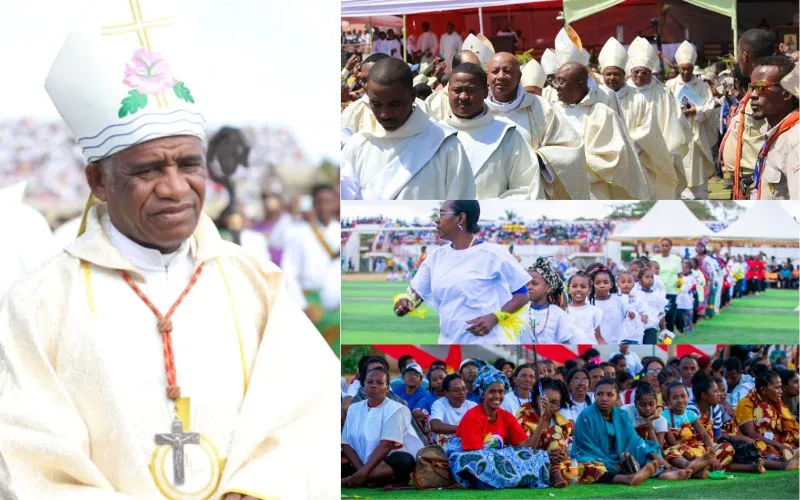The Malagasy Cardinal, who started his Episcopal Ministry in February 2001 as Bishop of Fenoarivo Atsinanana Diocese spoke about the formation of future Priests amid contemporary realities, including “globalization, scientific advancements, and cultural shifts.”
In the August 24 interview with ACI Africa, Cardinal Tsarahazana said that the highlighted contemporary realities can “undermine the faith if not properly addressed.”
“We must be vigilant, especially in a country like Madagascar, where poverty makes it difficult to live out our faith according to the will of God,” the Malagasy Cardinal said.
He underscored the importance of “discernment” in the formation of future Priests, noting that while Madagascar is “blessed with vocations, it is crucial to ensure that those called to serve are deeply committed to their faith.”
“Every time we organize a meeting in my Diocese, I always talk about the importance of a testimony of life. It is not enough to be in a hurry; we must live out our faith authentically,” the Cardinal said.
(Story continues below)
He went on to caution against divisions among the people of God, urging the Clergy, women and men Religious, and the Laity to be “true witnesses of the Gospel.”
“We must comfort the Christians because they are already facing difficult lives,” he said, and added, “It is up to us to provide them with the courage and support they need.”
Youth and Evangelization
The Catholic Church leader lauded youths in Madagascar for their role in the Church amid challenges in practising their faith in a “rapidly changing world.”
“We must always think about how to accompany our youth so that they remain faithful to the teachings of our Lord,” he said, and added, “This is a great challenge, but it is one we must face together.”
Addressing himself to young people across Africa and globally, the Malagasy Cardinal emphasized the need for hope, cautioning against despair.
“We must not be afraid,” he said, referring to St. John Paul II’s Message to the youth of the world on the occasion of the 15th World Youth Day 2000.
The Cardinal added, “We must be proud to be Christians, to be Catholic Christians; we must cultivate our faith, share it, and pray together.”
He also spoke about the call to holiness, saying, “In Madagascar, there are laypeople, blessed people, and religious people who have achieved great holiness. This shows that holiness is accessible to everyone, regardless of their state in life.”
Cardinal Tsarahazana emphasized, “Holiness is not just for Priests or Bishops. It is a call for every Christian, and it is our duty to respond to that call.”
Evangelization
“It has been almost 200 years since the faith was brought to Madagascar, and while the Church is growing, many Dioceses remain in a state of primary evangelization,” the Cardinal said, attributing the situation to the “deep-seated traditional beliefs that continue to influence Malagasy society.”
“We still have traditional beliefs in God, but also in other forces, such as evil spirits. To change this mentality and bring about true conversion takes time and grace,” Cardinal Tsarahazana said.
He added, “As the Church, we must address this by focusing on the essentials of our faith: truth, love, and the teachings of our Lord.”
Despite the challenges, the Cardinal highlighted some “positive impact” that the Church in Madagascar has, including sending missionaries to other parts of the world, which he said is a “testament to the strength of the local Church.”
“This shows that the Gospel has truly taken root in Madagascar. We are not just recipients of the faith; we are also bearers of the faith, sharing it with others around the world,” the Cardinal said.
Synod on Synodality
Cardinal Tsarahazana lauded initiatives that Church leaders in Africa undertake to foster human dignity, saying the Church in Africa wants to be the “voice of the voiceless.”
“The Church’s synodal journey is oriented toward the Kingdom. In this journey we must listen to each other, walk together, and reject ideologies not based on the teachings of the Church,” he said.
The Malagasy Cardinal went on to highlight the importance of communion in the synodal process, urging the people of God to “live out their faith in every aspect of their lives.”
“Almost all those responsible for governance in Madagascar are Christians, yet we find ourselves in a situation of deep poverty. This suggests that we are not truly living out our Christian values; we are not living the synodal values,” Cardinal Tsarahazana said.
He urged Christians to allow their faith to transform them, cautioning against “hypocrisy.”
“If we pray but do not let our faith change our behaviour, we are living in hypocrisy. We must have a deep, solid faith that manifests in our actions,” Cardinal Tsarahazana said during the August 24 interview.
He added, “We must love the people we serve, just as the early missionaries who came to Madagascar loved the people, even before they could speak the language.”
Jude Atemanke is a Cameroonian journalist with a passion for Catholic Church communication. He holds a Bachelor’s Degree in Journalism and Mass Communication from the University of Buea in Cameroon. Currently, Jude serves as a journalist for ACI Africa.








